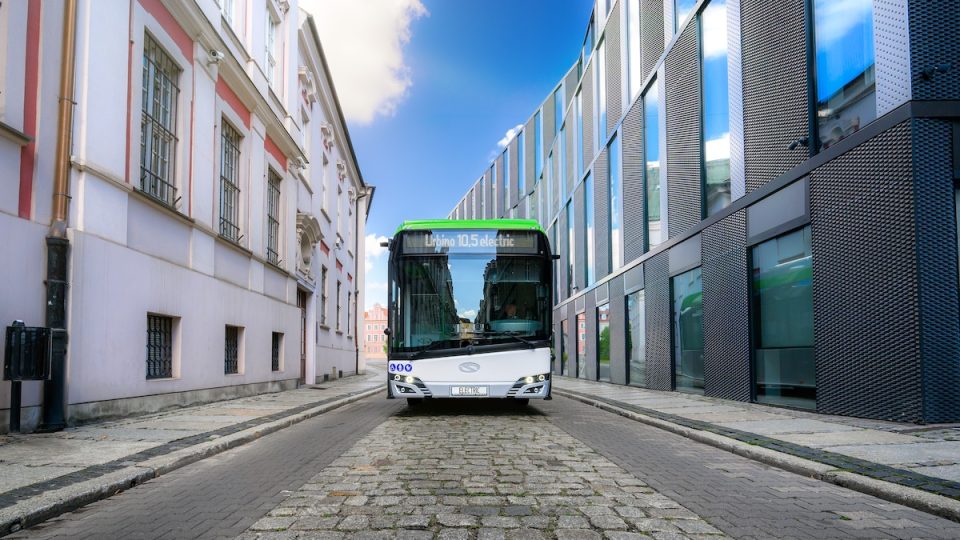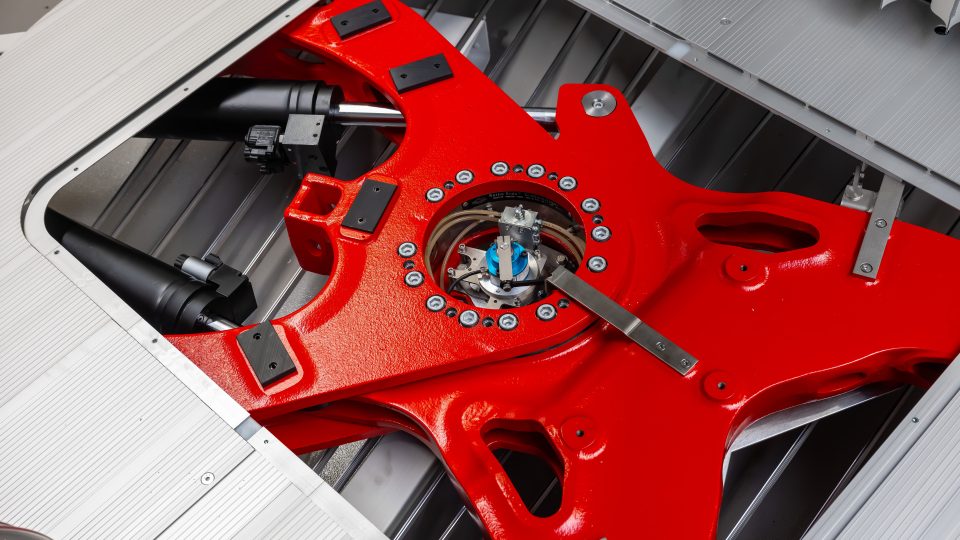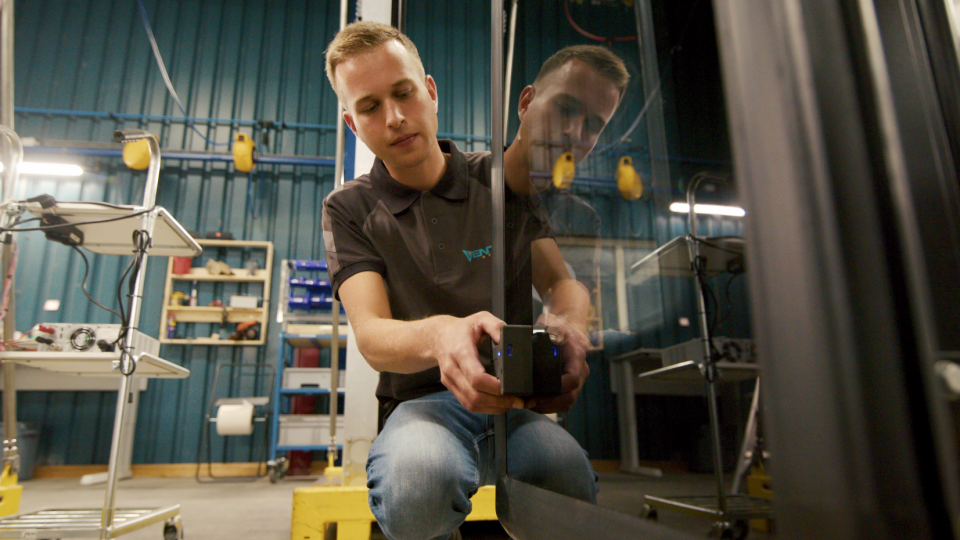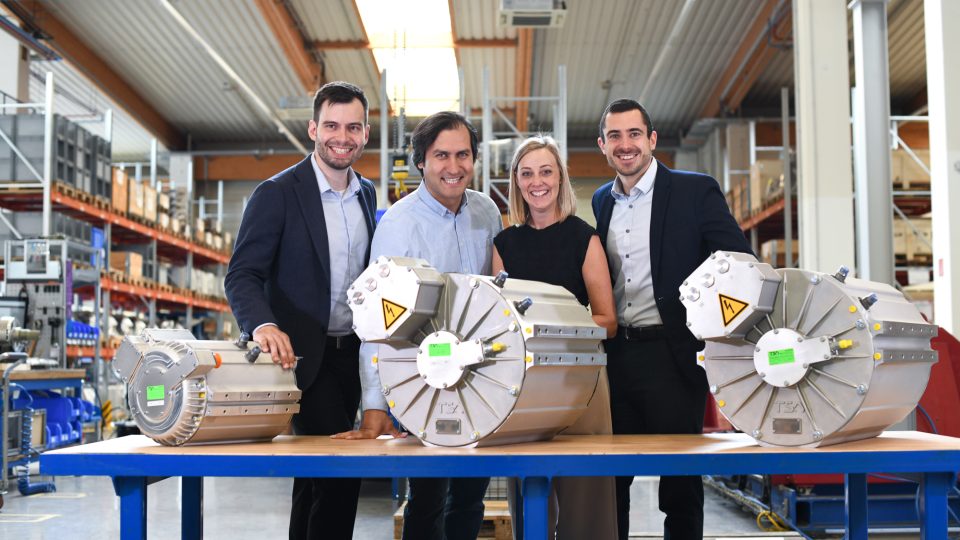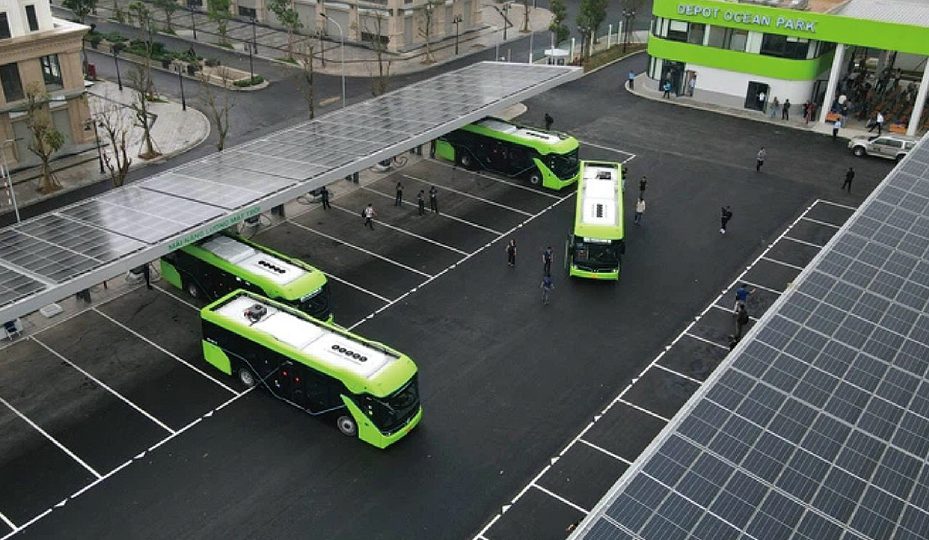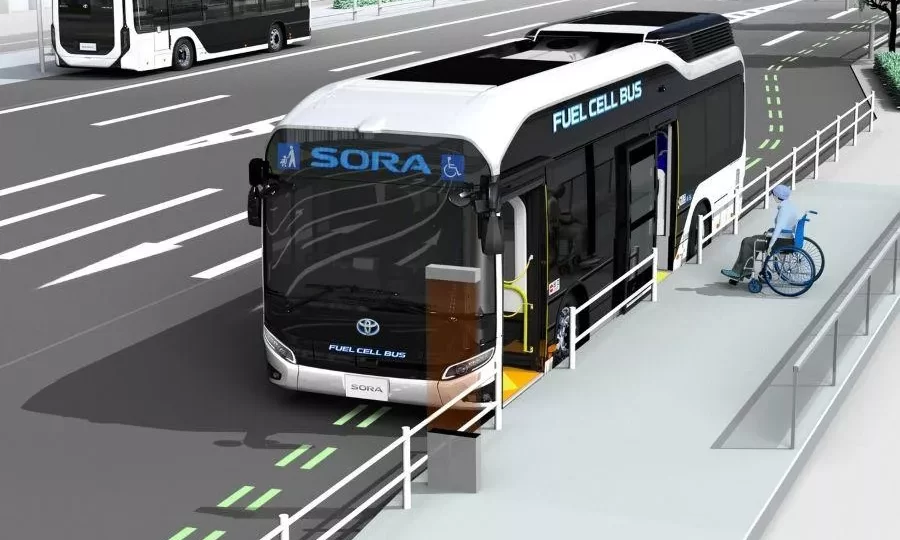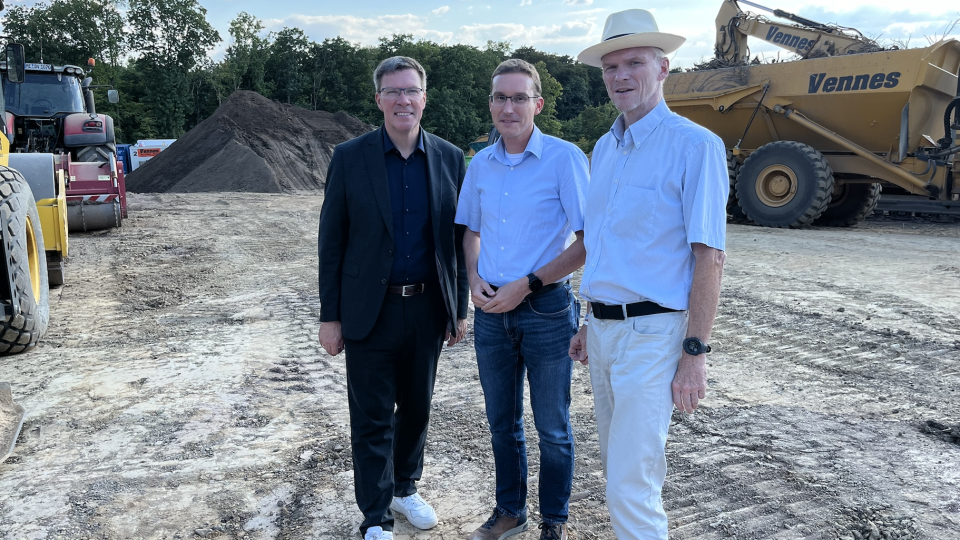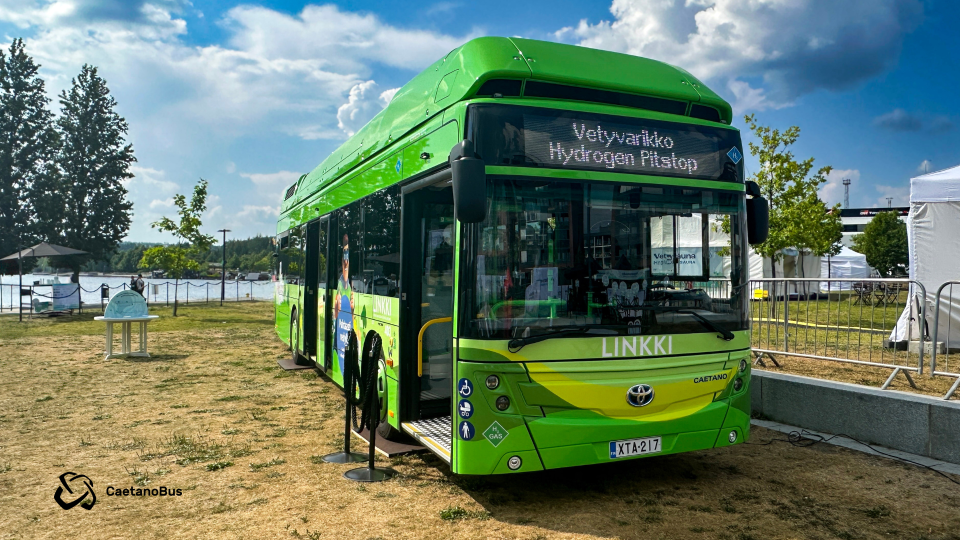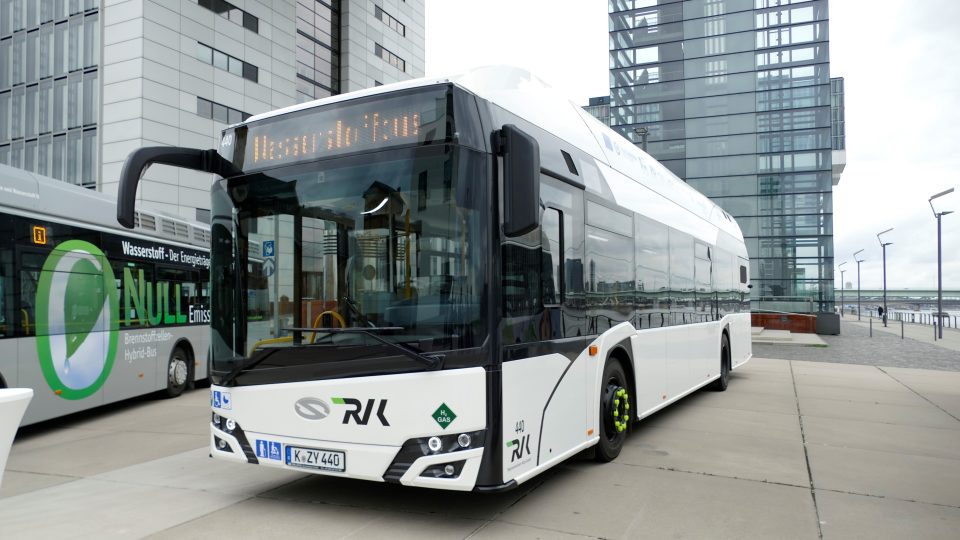Fuel cell bus projects in the spotlight: fleets, manufacturers, trends
A total of 370 fuel cell buses were in operation in Europe as of 1 January 2023. But there are plans to get over 1,200 by 2025. In Europe 2021 has been a watershed year: with 158 registrations, that market grew of 236% in Europe. In 2022, on the other hand, registrations in the Old Continent […]
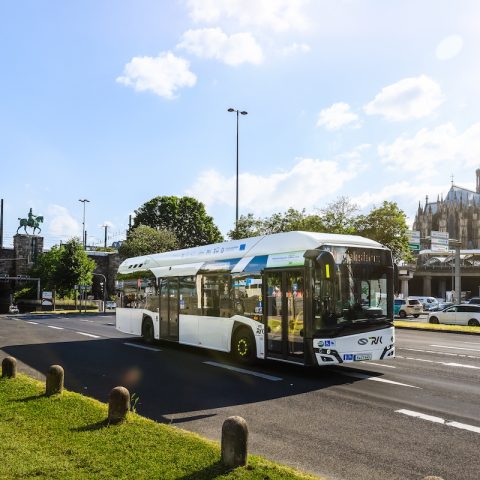
A total of 370 fuel cell buses were in operation in Europe as of 1 January 2023. But there are plans to get over 1,200 by 2025. In Europe 2021 has been a watershed year: with 158 registrations, that market grew of 236% in Europe. In 2022, on the other hand, registrations in the Old Continent decreased: 99 units. Many funding schemes are in place in Europe nowadays (we tried to take stock of the situation here).
However, despite promising potential, the current state of hydrogen technology in the bus market remains marginal, with just 378 units registered all around Europe in 2024. Although growing +82% on 2023, hydrogen buses cover just 4.6 of the zero emission bus market, with BEV buses covering the remaining 95%.
In the first half of 2025, a total of 279 units were registered, a 426% growth on the 53 registered in January – June of last year. 2024 ended with a record figure of 378 H2 buses registered… this year we are already at 74% to achieve the same volume.
The largest single fuel cell bus tender so far has been awarded to Solaris in September 2023: 130 Urbino 12 hydrogen will be deployed in Bologna (Italy) by TPER within 2026. And Solaris was leading the market in 2024 with 225 deliveries, followed by Wrightbus and CaetanoBus.
| Year | Fuel cell buses over 8 ton registered in Europe |
| H1 2025 | 279 (+426% on H1 2024) |
| 2024 | 378 (+82%) |
| 2023 | 207 |
| 2022 | 99 |
| 2021 | 158 |
Fuel cell buses: for cities or highways?
As proved by the plans put in place by most of the heavy-duty truck players, hydrogen fuel cell technology is gaining ground as the preferred option for the ‘post-diesel’ future in long-haul operations (with MAN at the moment on a quite different position…). According to a report by Interact Analysis, 74% of coaches are estimated to be non-electrified in 2030 in EMEA region. In that segment, for a few years we’ll mostly see plans, targets and pilot projects.
However, at the moment most of the fuel cell buses are working in urban and suburban environment, where they provide, balancing the higher cost for purchase and operate, some significant advantages exemplified by Vienna’s choice to go for hydrogen for the city center’s routes: “charging infrastructure is no longer required in the city centre and the vehicle fleet for routes 2A and 3A can be reduced from 12 to 10 buses”, stated the company when, in July 2024, issued an order for 10 Rampini fuel cell buses set to replace 12 BEV buses from the same supplier.
Europe: three initiatives on fuel cell coaches
In Europe, three initiatives focused on the development of fuel cell coaches have been announced so far. Firstly, FlixBus launched the HyFleet project in collaboration with partners Freudenberg Fuel Cell e-Power Systems and ZF in 2021. The project aims to conduct research and advance fuel cell technology. Goal: having hydrogen long-distance buses on the European network by 2024. The minimum range request is 450 km on a single refilling. “A European bus manufacturer will also join the project in the future”, it was stated at the time.
In a February 2022 interview with Sustainable Bus magazine, Michael Milch, Director of Program Management at Freudenberg Fuel Cell e-Power Systems GmbH, emphasized FlixBus’s recognition of the necessity to adapt fuel cell technology for heavy-duty applications. Milch highlighted that the existing fuel cell technology primarily stems from passenger car technology, with a typical lifetime of 5,000 to 8,000 hours. However, the heavy-duty sector demands higher durability: he says that Freudenberg has developed a dedicated heavy-duty design approach to meet this requirement, targeting a minimum lifetime of 35,000 hours.
Secondly, the CoacHyfied project, led by the service provider FEV Group, was launched in March 2021. With partners including Ballard Power Systems, ElringKlinger, Otokar, Engie, and Ford Otomotiv Sanayi A.Ş, a Turkish Ford subsidiary, the project brings together expertise from various sectors to drive advancements in fuel cell technology. The total project duration is scheduled for five years. In the course of CoacHyfied project, two types of coaches will be investigated: OEM-based, newly produced fuel cell buses, and existing buses that have been converted to fuel cell propulsion.
The evolution of fuel cell bus concepts in Europe
It must be said that a nice slice of buses that are still in service today actually dates back to projects developed before the battery-electric frenzy that led to a massive abandonment of fuel cell bus projects (to name but one example: Mercedes). Projects that are currently being resumed with a refreshed perspective: some ten years ago, fuel cell technology was promoted as a solution for urban buses, while nowadays there is general agreement on FCVs as a future alternative to diesel for medium and long-range travel, from suburban routes to long distance transport.
However, today’s fuel cell buses have a significant difference compared with those launched ten years ago: the only concept available today see the fuel cell module working together with a small battery, with the latter being charged by the fuel cell and powering the motor. More properly said: fuel cell hybrid electric buses.
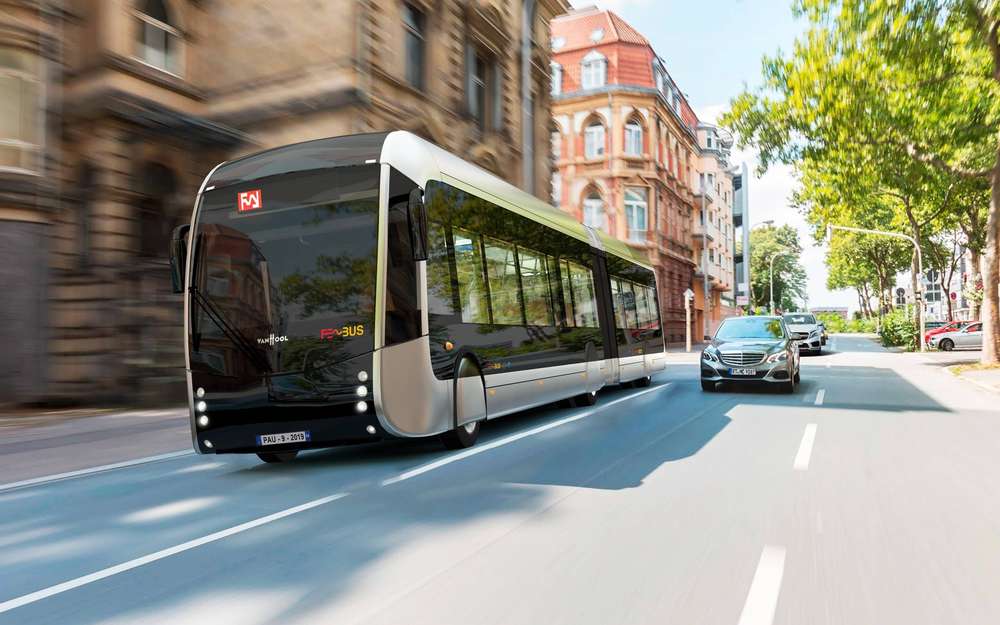
Fuel cell bus: focus on costs
According to Bart Biebuyck, Executive Director of the FCH JU, (statements dating June 2020) «360 hydrogen buses should be on the road in 2021 in the framework of JIVE 1 and JIVE 2 projects. And costs? The first hydrogen bus in 2010 had a price of 1.8 million euros. Today, the H2Bus Consortium has set the goal of reducing that figure to 650,000 euros» he told in an interview with Sustainable Bus.
However, aside upfront cost, operational costs are another issue. A study by Eurac Research out in September 2023 found that, for the same mileage, FCEB operating costs are 2.3 times higher than those of BEBs. The study, published in the Journal of Energy Storage, contains insightful data on the efficiency of battery electric buses and fuel cell buses and on their energy consumption with a focus on running costs for the two technologies (not the TCO, then).
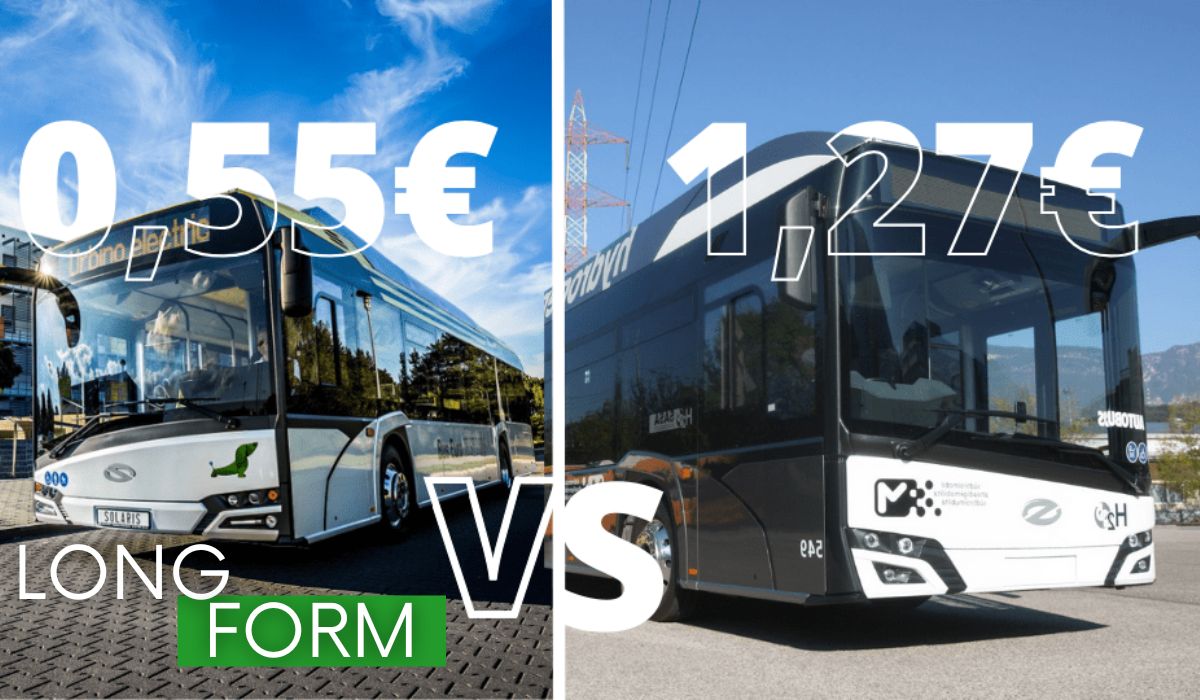
Well, according to Eurac’s calculations, the operating costs for BEBs and FCEBs end up being €0.55/km and €1.27/km, respectively. This means that, for the same distance, FCEB operating costs are 2.3 times higher than those of BEBs.
Fuel cell bus deployment, focus on Asia. According to BloombergNEF
According to BloombergNEF EVO2020 report, «FCVs achieve higher adoption rates in commercial vehicles and buses». As of late 2020, mentioning what Aleksandra O’Donovan, Head of Electrified Transport at BloombergNEF, told us in an interview published on Sustainable Bus magazine #2, there were «about 4,250 fuel cell buses on the road, a fraction of the global bus fleet (1.5 million units). We expect to see uptake of fuel cell buses over the next 20 years in China, South Korea and Japan. China and South Korea in particular are now promoting fuel cell technology as the countries attempt to build a new industrial value chain around it. However, due to the economic advantage and advanced adoption rates of e-buses over fuel-cell buses, we believe the latter to play a complimentary role to e-buses, especially for hard to electrify routes».
After all, China always proves to be ahead when it comes to the transition to zero emission buses. The city of Nanjing, for instance, is planning to switch the battery-electric bus fleet (that amounts to no less than 7,000 vehicles) to hydrogen.
Van Hool, fuel cell buses since… years. Before bankruptcy…
As of December 2020, Van Hool (that in 2024 filed for bankruptcy and was taken over by Dutch VDL) fuel cell buses have travelled for 10 millions kilometres. 141 vehicles had been sold until end 2020 (delivered or on order). What is more, Van Hool has got significant follow-up orders from customer such as Qbuzz in Groeningen, that bought 2 vehicles in 2017 and has ordered 30 units more in 2020, and RVK Cologne, which is adding 35 fuel cell buses to the existing two.
2019 has been a significant year for the Belgian manufacturer, with regards to hydrogen bus activities: the new A330 FC hydrogen bus and the innovative Van Hool Exqui.City 18 FC bus have been launched. The latter debuted in December 2019 in Pau, south of France. It stands out for being the world’s first hydrogen-powered BRT system. Eight Van Hool Exqui.City FC 18-meter hydrogen buses serve 14 stations along a six kilometre long dedicated BRT lane with priority at crossroads.
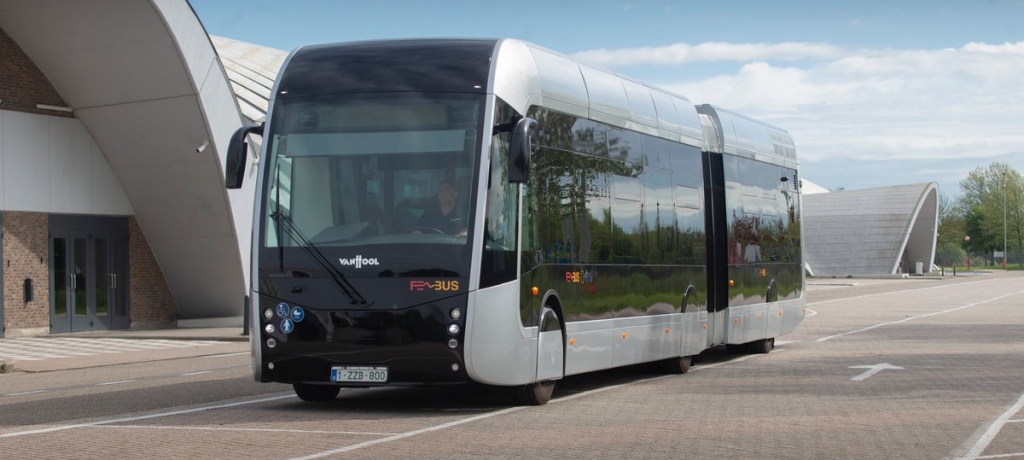
Van Hool, the commercial viability of fuel cell buses…
Here’s the position of Van Hool’s CEO Filip Van Hool with regards to commercial viability of fuel cell solutions: «Hydrogen buses are already competitive when you compare them with battery buses. In many cities there have been tests on battery buses in these years, and the conclusion very often is that the battery electric bus is good inside the city because it has limited range. When operators need more range, there are some problems. It is impossible to replace one diesel bus with one battery electric bus: you need more battery electric buses, because of longer charging times and limitation in range. I think battery buses and hydrogen buses will coexist. If the operator doesn’t want to double the number of vehicles and needs longer range the best application is hydrogen. But we don’t believe only on hydrogen: we have also battery buses in portfolio. Today is necessary to have everything. You know why?»
2019, fuel cell buses from Solaris and CaetanoBus unveiled
In 2019, taking the opportunity of the UITP Global Public Transport Summit, Polish manufacturer Solaris Bus & Coach launched its first fuel cell bus Solaris Urbino hydrogen.
Solaris fuel cell bus is basically structured as its battery-electric counterpart, hence made of stainless steel but sporting roof-mounted hydrogen tanks as its distinctive feature. The traction system is unchanged. Batteries are smaller than on the Urbino Electric: the bus ordered by SASA will be fitted with 30 kWh of High Power, the type designed for quick charging, by virtue of its high maximum charging power. The beating heart of the hydrogen bus is the fuel cell FCmove-HD 70 kW stack by Ballard Power Systems, the main global player providing fuel cells to heavy-duty commercial vehicles. Ballard can boast collaborations with Van Hool and VDL, and with the British bus builder Wrightbus.
Solaris, the fuel cell buses ordered in Bolzano
Italian operator SASA Bolzano has been the first to place an order for the vehicle, commissioning 12 units. These deliveries will be performed in 2021, with delivery completed in May.
It is worth mentioning that SASA has already carried out an experiment with hydrogen buses, namely five Mercedes Citaro fuel cell buses, as part of the EU-funded CHIC (Clean Hydrogen in European Cities) project. The vehicles are still in operation.
In early 2021, Solaris has also sold 13 fuel cell buses in Frankfurt. The buses are to be deployed on target routes in 2022. The Polish company announces it has won a tender call made by the company In-der-City-Bus which is in charge of public transport in Frankfurt.
CaetanoBus: the hydrogen bus with Toyota tech
Solaris has not been the only bus manufacturer to choose the year 2019 to unveil its first fuel cell bus project. Portuguese Caetano debuted on the fuel cell bus stage in October 2019 at Busworld with its H2.City Gold, shortly after Solaris had taken advantage of June’s UITP Global Public Transport Summit to plant a flag in the segment, too. The Caetano has a major string to its bow: its exclusive partnership with Toyota. The Portuguese bus builder will be the first to use the Japanese colossus’ fuel cells.
Caetano fuel cell bus H2.City Gold is also the only model shorter than 12 m. While Solaris reserves hydrogen for its 12 m and Van Hool already has the 12 m and 18 m on the range, Caetano offers a 10.7 m variant. Though matching the high costs of hydrogen technology to a low passenger capacity model may look like a gamble, this version has the merit of filling a gap in the market.
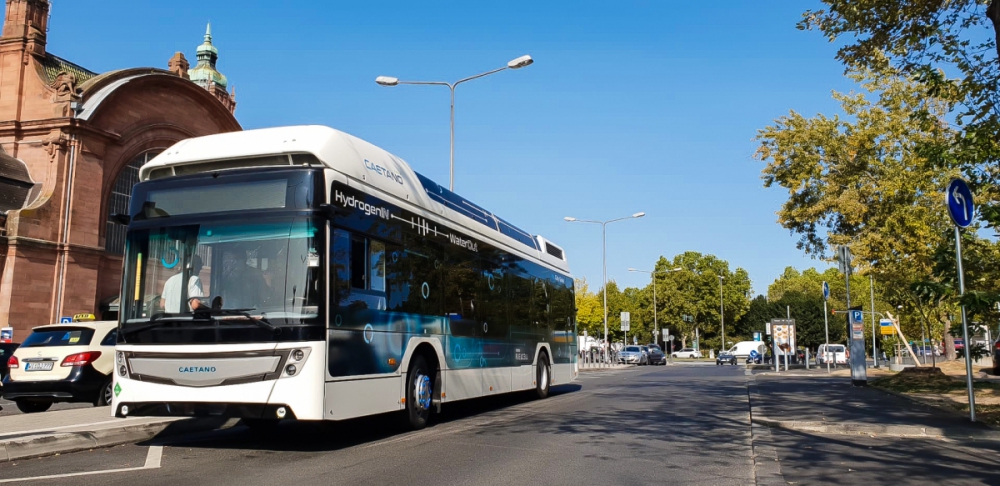
Toyota invests in CaetanoBus: a bet on hydrogen bus technology
The cooperation with Toyota has been extended in late 2020, when it was announced a strategic alliance: Toyota Europe has joined forces with CaetanoBus and Finlog in an effort dedicated to the development and production of fuel buses in Europe.
CaetanoBus and Industria Italiana Autobus (IIA) have signed an agreement in October 2022 to start the production and marketing in Italy of hydrogen-powered city buses based on Toyota Fuel Cell technology and an H2.City Power Kit system developed by CaetanoBus.
Rampini launched a 8-meter fuel cell bus
With regards to the size, Rampini unveiled in September 2022 the Rampini Hydron, powered by hydrogen fuel cell: announced in late 2020, Rampini Hydron is an 8-meter long hydrogen bus capable of transporting up to 48 people and features a stated range of 450 kilometers. It is the first H2-powered 8-meter bus in Europe. Canadian Loop Energy has been chosen as fuel cell module provider. A 10-units order was landed in late July 2024 by Wiener Linien.
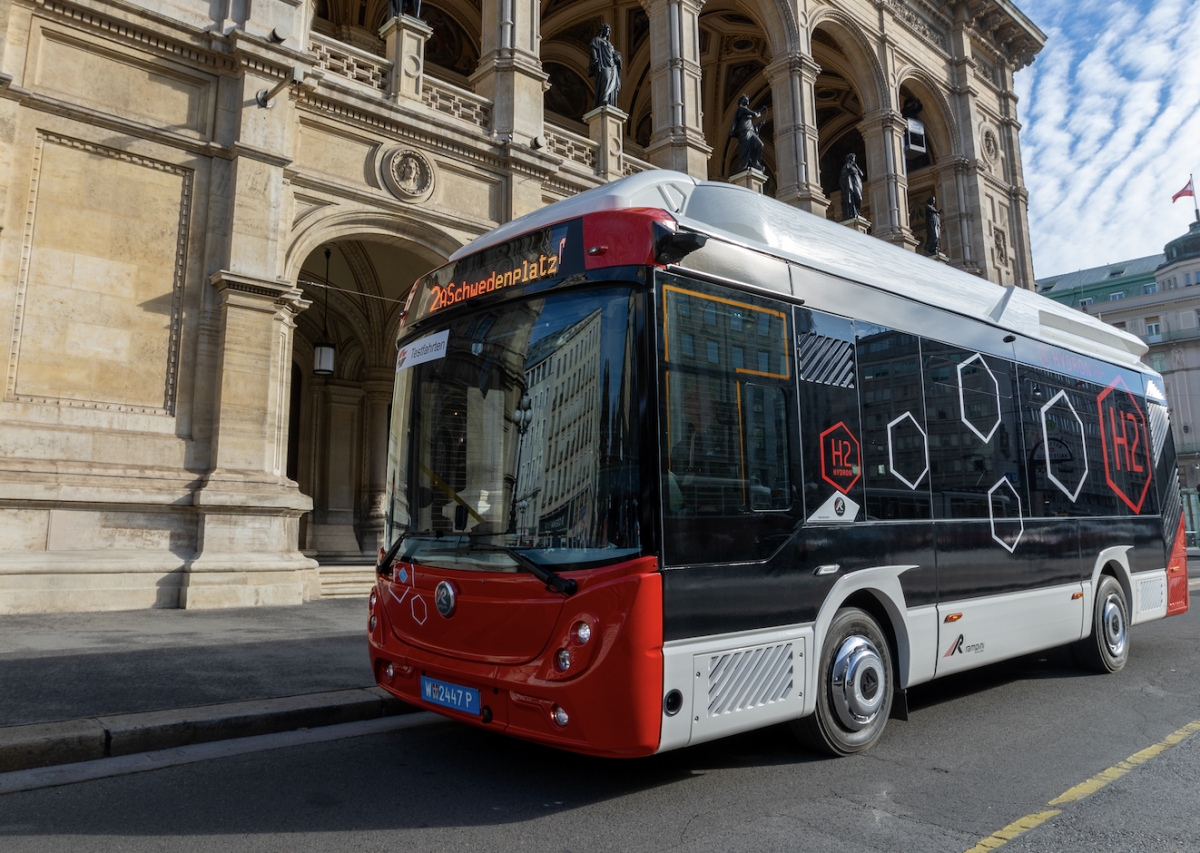
Skoda, here it comes the fuel cell bus
Skoda entered the fuel cell bus segment at InnoTrans 2022, where the Czech company launched the new hydrogen-powered Škoda H’CITY 12 bus. The vehicle is based on the very same platform as the E’CITY e-bus and the trolleybus Skoda T’CITY, both launched in the same year.
Škoda H’CITY 12 bus uses PEM fuel cells as its power source, in which hydrogen (stored in roof-mounted tanks with capacity 39 kg) and oxygen reactions take place, and batteries in which the energy produced is stored.
Safra with Symbio: the French-made fuel cell bus
Still in 2019, the French manufacturer Safra launched a French-made fuel cell bus made in cooperation with Michelin’s subsidiary Symbio (the hydrogen’ specialist in Michelin group). The bus Safra Businova H2 features, according to the manufacturer, a range of 300 km available after 30 minutes’ charging time. The first units (6 in total) have been delivered to Artois-Gohelle, and further five units are headed to Auxerre.
The fuel cell bus from Safra features a bi-modular chassis and a free-standing structure. Safra and Symbio opted for a smart hybrid system, integrating a 30kW fuel cell module (model H2Motiv) and a 132kWh battery pack (a “mid-power” unit). This means that the bus carries less hydrogen than a “Full Power” solution (which uses a small battery and a large cell). For instance, the Solaris Urbino 12 hydrogen has a 29 kWh battery.
However, in 2022 Safra unveiled its new model Hycity. Giving some numbers, the range claimed by the manufacturer is 350 km, while it takes just 15 minutes to quickly recharge the batteries, supplied by Microvast. More than 100 passengers, on the other hand, the maximum capacity. High-quality components: the fuel cells are by Symbio, by Thermo King the ventilation and by ZF the axles.

2020, fuel cell bus orders are ramping up
2020 has been a record year with regards to fuel cell bus orders.
Cologne and Wuppertal, in Germany, are leading the way in the country: 15 hydrogen buses from Solaris have been ordered in Cologne and ten further units headed to Wuppertal. Therefore, the affiliated transport company of the transport association Verkehrsverbund Rhein-Ruhr are to get a total of 25 hydrogen-fuelled Solaris vehicles. The two public transport companies had also previously ordered together a fleet of 40 Van Hool A330 FC fuel cell buses (with first deliveries in Wuppertal in late 2019).
Finally, in mid 2022 RVK Cologne has awarded as many as 100 fuel cell buses to Solaris and Wrightbus.
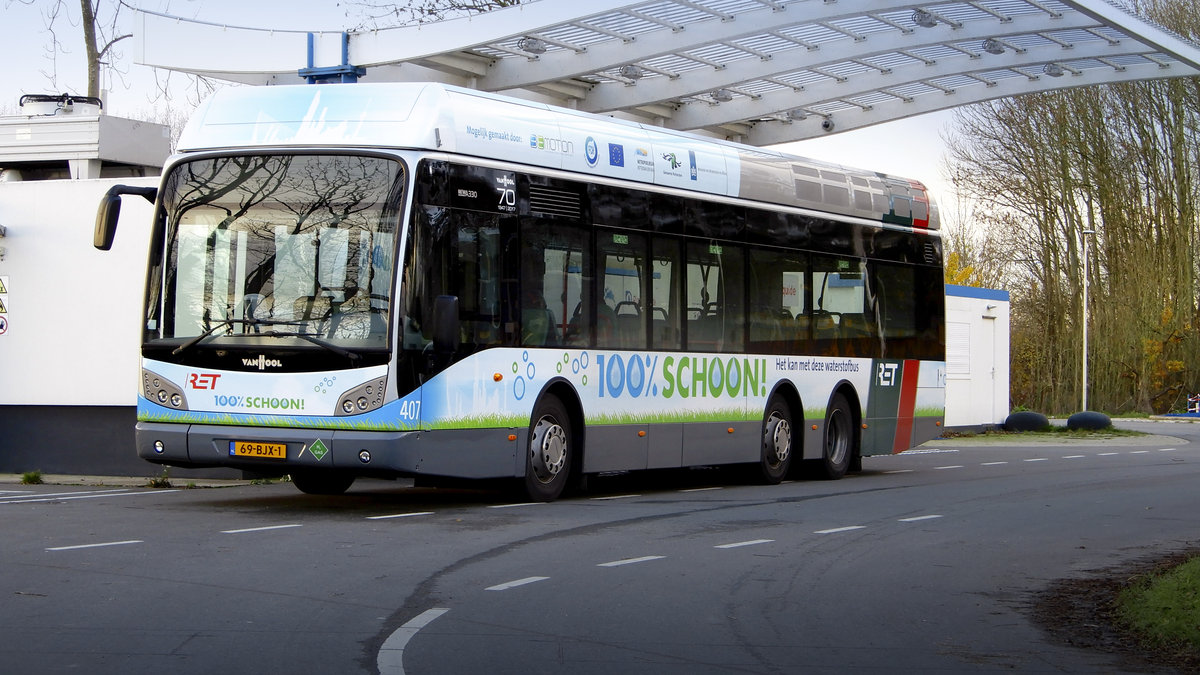
A small order for Solaris came from Sweden, where Transdev will roll out two fuel cell buses in the city of Sandviken. They’ll be the first hydrogen buses to be operated on the Swedish public transport system.
Much attention was gathered by TMB Barcelona procurement for 8 fuel cell buses, issued in summer 2020. TMB’s roadmap addressed at the decarbonization of Barcelona’s bus fleet has the goal to replace all pure diesel buses by 2024, except minibuses. In September 2020 the contract was awarded to CaetanoBus. Concerning the H2.City Gold, a few units are headed to Germany, in Niebüll and Bielefeld.
VDV: fuel cell buses for longer routes
The German strategy on hydrogen launched in 2020 got the appreciation of the national transport association VDV, that consider hydrogen buses a feasible alternative for public transport services on long routes. The VDV pointed out that the industry is facing with a big challenge: the number of manufacturers of hydrogen-powered buses is still very small and many system components are not yet fully developed. Furthermore, regular-service buses with alternative drive systems are still comparatively expensive to purchase.
Hyzon Motors, towards the fuel cell bus field
What is very interesting in TMB Barcelona’s tender mentioned above is that three bids were submitted: beyond CaetanoBus and Solaris, an offer was presented by Hyzon Motors Europe B.V. / Holthausen Clean Technology B.V., the joint venture established by the new player Hyzon Motors in the European market.
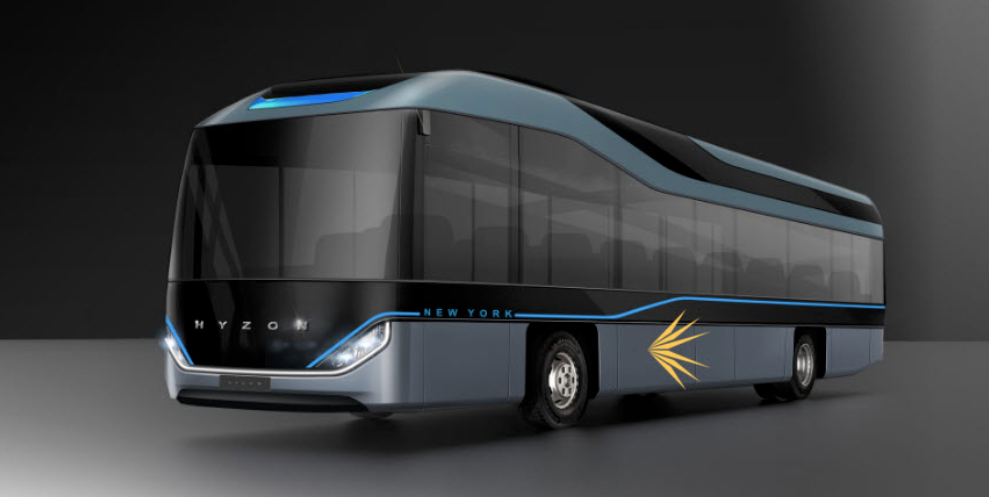
Hyzon Motors has been officially launched in mid-March 2020, and follows the experience developed from Horizon Fuel Cell Technologies. Announced as a company specialized in hydrogen heavy-duty vehicles based in New York State, Hyzon said that series production of its vehicles (trucks and buses) is to begin late this year. On April 4th 2020 Hyzon Motors’ stated on Linkedin that «Hyzon Motors Inc. announces that 1,000 units 40FT/12M fuel cell bus MOU (Memorandum of Understaing) was signed with a client under confidentiality. Target to deliver the first 50 units in about 12 months after formal contract».
In an interview we had with Hyzon Motors’ CEO Craig Knight in November 2020, he told us that «we are looking also at the opportunity to work with European bus builders in order to take part in hydrogen bus tenders. We don’t make chassis and full vehicles: we are focused on fuel cell powertrains and hydrogen systems, so it’s important for us to put partnerships in place. We want to be more active in Europe. We will move to a larger facility in 2021 that will enable series production. We plan to become a lot more aggressive in 2021 in terms of participation in tenders and we will be working on a vehicle range for the European market with our fuel cell technology».
Hydrogen buses, VDL makes its first steps
A metaphorical award for the most original hydrogen bus layout to date goes to the VDL-made fuel cell buses deployed in the Netherlands by Connexxion starting in summer 2020. The vehicles are realized adding a trailer (housing the fuel cell technology) to the bus, that actually results in a battery-electric bus with fuel cell range extender.
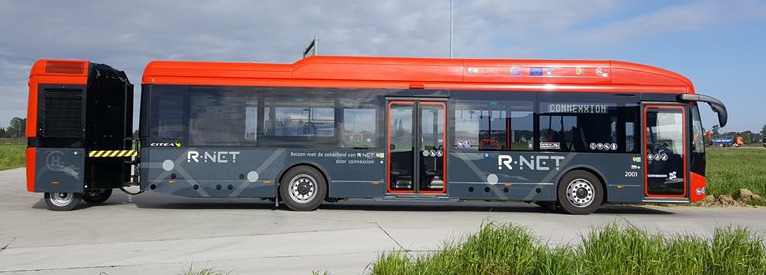
The range extender system has been developed by Bosch Engineering GmbH together with VDL Enabling Transport Solutions within the scope of EU-funded GiantLeap project. Fuel cell stacks are provided by Ballard Power Systems. The vehicles operate between Rotterdam and the Isle of Goeree Overflakkee.
Hydrogen for long distances: Flixbus prepares the ground
FlixBus announced in late 2019 that the group is working to prepare the introduction of hydrogen buses in its long distance bus network. A collaboration between the green and orange colored brand and Freudenberg Sealing Technologies, aimed at studying this possibility, has been launched.
In the future, the partnership will be enriched by the contribution of a bus manufacturer. FlixBus and Freudenberg, they announce, are currently holding talks to finalize project parameters. According to the information made public so far, a representative bus fleet of 30 Flixbus fuel cell buses is expected to be equipped with a hybrid powertrain (that combines fuel cell module with battery packs) to validate system performance. The two companies are also aiming for public funding within the framework of the German “National Innovation Program Hydrogen and Fuel Cell Technology” (NIP).
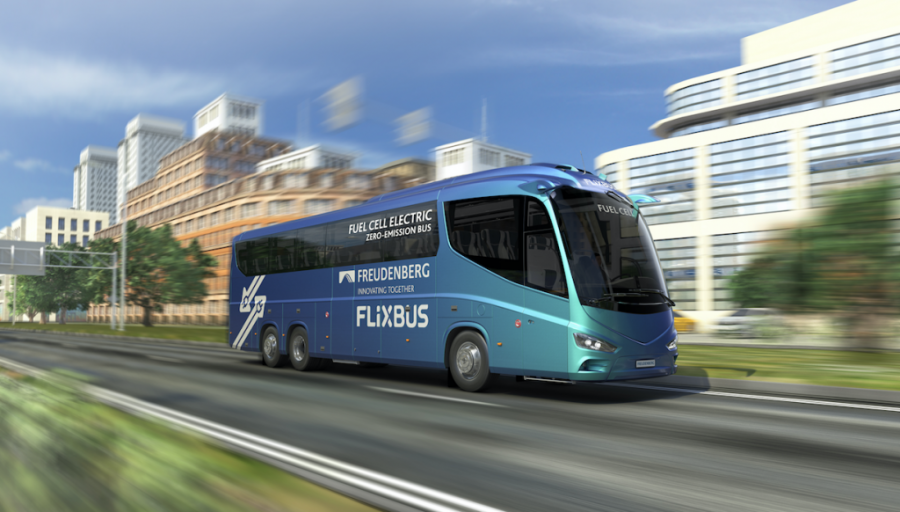
Hydrogen on coaches: it’s time for CoacHyfied!
Developing of fuel cell coaches is the intent of the CoacHyfied project, launched in March 2021. The EU-backed project is led by service provider FEV Group and aims to identify existing challenges and elaborate suitable solutions by developing and operating six fuel cell coaches in public and commercial transport, both local and long-distance.
A consortium of 14 companies from the fields of development, technology and science is part of the project. The demonstration phase under real operating conditions of the buses started at the beginning of the year and will last up to three years. The total project duration is scheduled for five years.
Hydrogen buses in Australia, a project
May 2020, an ambitious project on fuel cell buses saw the light in Australia. 100 hydrogen buses on Australian roads. It’s the target, at least for Phase 1, of the H2OzBus Project, which has the goal of exploring delivery of innovative and sustainable transport solutions in the country.
Public transport operator Transit Systems group has announced it is joining strategic partners Ballard Power Systems, BOC Limited, Palisade Investment Partners and ITM Power in the project group. The partners have just signed a memorandum of understanding as a further step in evaluating and demonstrating the concept of hydrogen fuel cell electric buses for use in public bus transport in Australia.
Fuel cell buses in the US
In the US, an hydrogen bus fleet began operations in early February 2020 operation with the livery of Orange County Transportation Authority (OCTA) in Santa Ana, California. The vehicles, model New Flyer Xcelsior CHARGE H2, were delivered following the order signed in early 2018. The vehicle was announced to have completed Altoona Test in March 2019.
In addition to launching the hydrogen bus fleet, OCTA also debuted the largest hydrogen fueling station in the nationfor public transportation, showcasing its $22.6 million investment in zero-emission transit.
CTE: fuel cell buses appropriate to large scale deployment
Dan Raudebaugh, Executive Director for the Center for Transportation and the Environment (CTE), told Sustainable Bus in an interview made in October 2020: «I think fuel cell buses will play a significant role in transit over the next 10 to 20 years. The early market deployments are being dominated by battery electric buses because battery electric buses are much simpler and more cost effective to deploy in small numbers. I think fuel cells and hydrogen will start to shine more with larger scale deployments. Converting five to 20 buses is pretty straightforward, and battery electric buses have shown to be a clear winner in this scenario. Transit agencies can usually find space for charging infrastructure in their depot, and have enough shorter blocks for battery electric buses. Fuel cells become very competitive when you look at converting 50 to 100 buses, especially if you deploy them all from the same bus yard. Fuel cells hold the promise of supporting those longer blocks and can be very price competitive in numbers of 50 or more».
Mercedes puts the fuel cell range extender on the eCitaro
2021 is going to be the year of the debut on the road of the Mercedes eCitaro REX. A name that identifies the eCitaro with fuel cell range extender, that the German operator SWEG intends to use in regular service in southern Baden (Germany) from 2022: the first order signed so far. The bus will be tested in Hamburg in 2021.
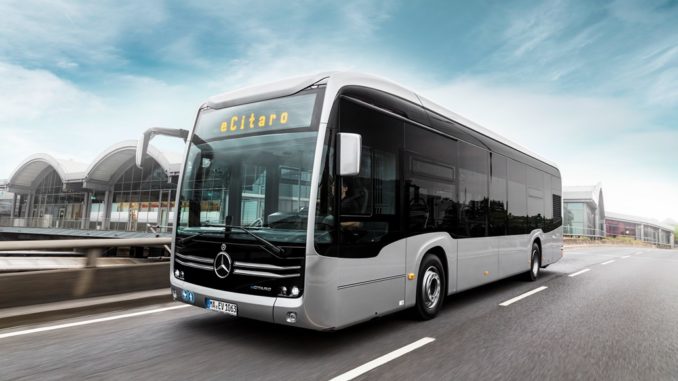
The range extender is a further step on the roadmap of improvements of the Mannheim-built battery-electric bus.The fuel cell range extender will be the distinguishing feature of the eCitaro REX. There won’t, in fact, any hydrogen-powered eCitaro, according to the company statements so far (although Mercedes developed strong experience some years ago with hydrogen buses, with some units still in operation). But the battery-bus will be offered in a version equipped with fuel cell range extender.
This increases the range once again and allow the eCitaro, Daimler points out, to finally replace conventionally powered city buses seamlessly, even when very high demands are made on range. State range is 400 km.
Looking at the long term, in 2039 Daimler Trucks & Buses plans it will be selling only battery-electric and hydrogen powered buses and trucks, at least in the main markets of Europe, North America and Japan.
Daimler – Volvo: welcome Cellcentric
Daimler Truck AG and Volvo Group officially outlined the strategy beyond the fuel cell joint venture Cellcentric, first announced in april 2020, in April 2021.
The roadmap is part of an industry-first commitment to accelerate the use of hydrogen-based fuel cells for long-haul trucks and beyond (also long distance coaches will be part of this development.
With the ambition of becoming a leading global manufacturer of fuel-cell systems, Cellcentric (founded in March 2021) is expected to build one of Europe’s largest planned series production of fuel-cell systems, with operation planned to commence in 2025. To accelerate the rollout of hydrogen-based fuel-cells, the two cellcentric shareholders call for a harmonized EU hydrogen policy framework to support the technology in becoming a viable commercial solution.
2022, large fuel cell bus projects gain shape
In late 2022 Bologna announced it launching one of the largest fuel cell bus projects in Europe so far, with 127 units expected to be in operation by mid-2026 (34 to arrive by 2024). Tender was published in March 2023, awarding was done in early September – as mentioned in the opening of this article. Winner? Solaris!
Germany: RNV has ordered in October 2022 up to 75 eCitaro with fuel cell range extender. A new depot to be built in Heidelberg
Poland: Poznan public transport operator MPK Poznań has purchased 25 hydrogen-fuelled buses that will be supplied by Solaris Bus & Coach, whose headquarters are close to the Polish city.
Fuel cell buses, those who are stepping back…
But there are also those who are stepping back from beginning fuel cell bus projects. Wiesbaden, for instance, has halted its project. The news was announced in December 2022. Ten fuel cell buses are set to be retired, a year after delivery. The publicly owned transport company’s €2.3m ($2.44m) filling station is reportedly no more operational since some time.
Change of plan was decided also in Montpellier in early 2022: the fuel cell bus project has been scratched, the city now bets on battery-electric buses.
Busworld Europe 2023: lots of news on the H2 side!
Irizar with the fuel cell coach
In 2023 Irizar has ‘donated’ to attendees at Busworld Europe one of its most important innovations. Busworld 2023 may go down in the annals for hosting the first presentation of a hydrogen-powered coach. In Brussels Irizar unveiled the Irizar i6S Efficient Hydrogen. Lot’s of hype!
Iveco launches the E-Way H2
Iveco Group and Hyundai Motor Company on 6th October 2023 unveiled the first Iveco Bus E-Way H2 at Busworld. The hydrogen-powered fuel cell electric bus is another concrete result of the partnership the two companies announced in March 2022 and reflects their commitment to accelerate the transition towards net zero carbon mobility and transport. The new model will expand the Iveco Bus zero-emission solutions for cities.
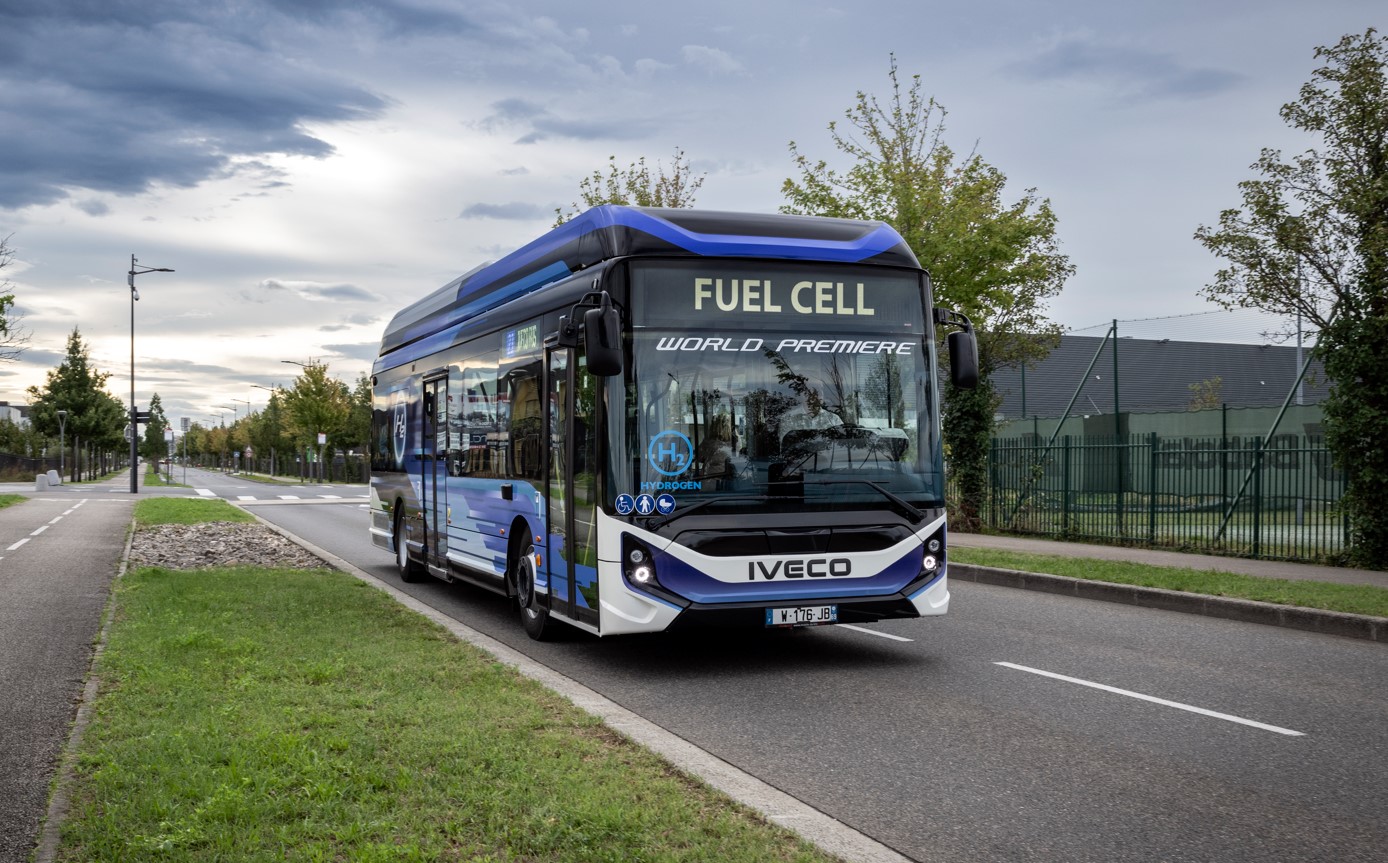
The E-Way H2 is a 12-meter-long low-floor city bus equipped with a 310-kW e-motor and a fuel cell system provided by HTWO, a fuel cell system-based hydrogen business brand of Hyundai Motor Group. With four tanks offering a combined storage of 7.8 kg of hydrogen and one 69 kWh battery pack by FPT Industrial, Iveco Group’s brand specialised in powertrain technologies, the vehicle offers a driving range of 450 km under normal operating conditions, Iveco Bus states.

